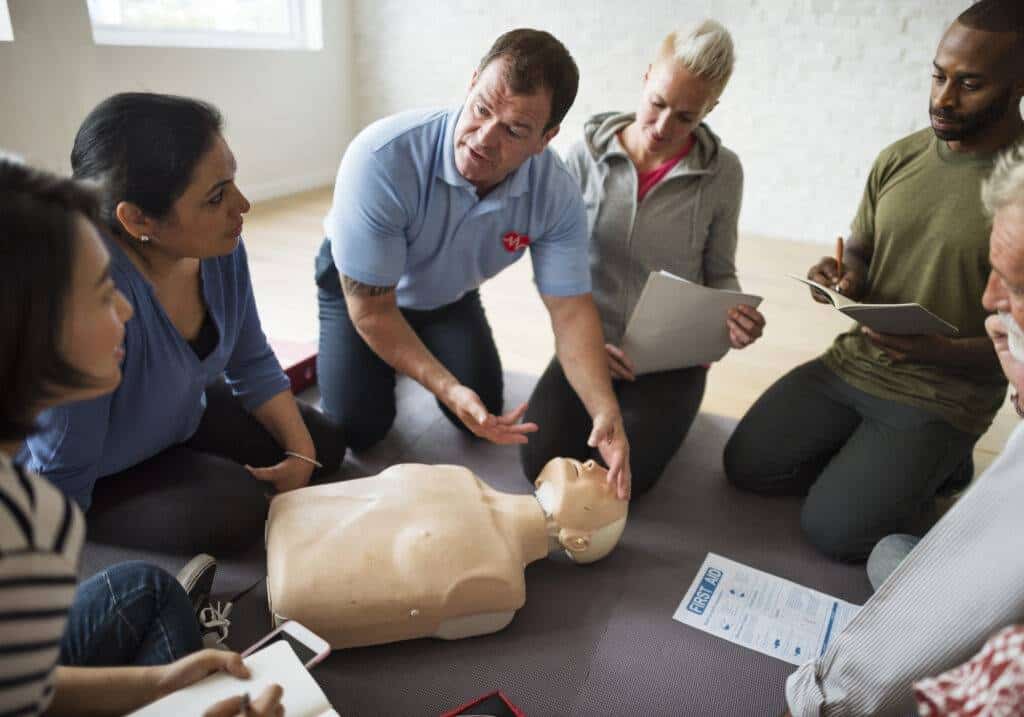What Can I Expect to Learn During First Aid Courses?
September 30, 2020

What is the Aim of First Aid?
Learning first aid can be the difference between life and death for someone who’s been involved in an accident or suffered an injury.
There are many different first aid qualifications out there, and it’s not simply a case of choosing one which looks the most exciting or interesting. Some first aid courses are specifically designed for delegates that have no experience, such as the flexible First Aid at Work and Emergency First Aid at Work courses. But others, such as the First Person on Scene or First Response Emergency Care, are designed to give experienced first aiders additional skills, resources and expertise in how they can preserve life more effectively and efficiently.
That being said, the majority of first aid training courses have a similar structure, and will cover many of the same topics, procedures and skills. These training courses aim to teach delegates similar techniques and skills, with the hope that delegates look beyond simply achieving a first aid certificate.
This article outlines what delegates can expect by attending a first aid course, and also provides guidance on how to make the most of such advanced, scenario-based training.
What Will Happen During My First Aid Training?
No matter which type of first aid training course you decide to take, there will be a handful of differences in what’s covered.
For example, during ATR’s First Aid at Work training (which gives successful delegates a Level 3 RQF qualification), participants will expect to learn vital first aid regulations, as well as how to report accidents in the workplace. Whereas our Trauma first aid course will primarily focus on teaching individuals who already have consolidated first-hand medical experience, how to treat trauma injuries immediately, perhaps using a catastrophic haemorrhage kit.
It really boils down to which first aid course you opt for. But for the purposes of clarity, you can expect the following in the majority of first aid classes:
- Explanation of best first aid practices - this will give delegates perspective on what first aid is, what it seeks to do, and how it can be effectively administered. This will give participants clarity on the best first aid skills to utilise, depending on how advanced and structured their course is.
- Theory-based sessions - it’s fair to say that no first aid training course would be without assessments and classroom-based content. While this is not exactly everyone’s favourite part of the course, it is still important, and forms an important part of the first aid assessment, although training instructors will observe progress and capabilities throughout the day(s).
- Scenario-based training sessions - training providers such as ATR utilise realistic scenario-based exercises for multiple reasons. Primarily to provide delegates with a vivid example of a first aid emergency, as well as assessing how they respond, react and administer first aid. These also help to improve spatial and situational awareness, two fundamental practices incorporated within ATR’s first aid courses.
- How to plan for first aid situations, and respond accordingly - preparation is a skill which is taught across the board. While many advanced first aiders are arguably well-experienced in preparing, others may not be, hence why they might take a course specifically-related to paediatric first aid, for example.
- How to use first aid equipment - most people know what a first aid kit is, but do you really know how to use itproperly? Or, in more specific cases, a trauma first aid kit? Courses will of course cover how to utilise the equipment properly, safely and efficiently, with certain courses covering more specific first aid boxes or bags, that are more closely-related to the content.
You can also expect how to respond to chokes, burns or bleeding, performing specific first aid techniques. Resuscitation techniques will also be taught.
How do I Prepare for First Aid Courses?
There are a few things which delegates can do to get the most out of first aid training.
Here are just a few recommendations:
- Wear loose-fitting, casual clothing, for maximum comfort during practical exercises.
- Give yourself enough time to fully embrace the course; don’t rush it.
- Don’t attempt to teach yourself, this can be contradictory to what you learn during an accredited course.
- Ask questions - instructors are there to help you.
- Brush up on any prior required reading material (if required).
- Come in with a positive attitude, and a willingness to learn.
First Aid Courses Available with ATR
ATR provide standard and bespoke first aid courses that can be tailored to fit your organisation’s or individual requirements. These include First Aid at Work and Emergency First Aid at Work, as well as paediatric first aid training and specific Road Traffic Accident courses.
